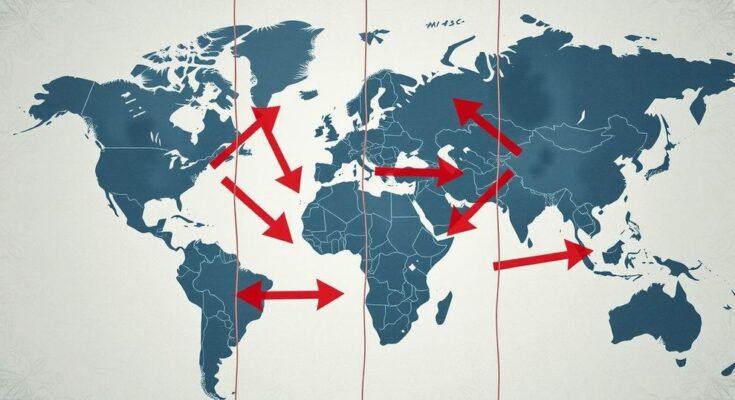Iran is facing confusion regarding its responses to recent US and Israeli strikes in Yemen and Gaza. Amid apprehensions about escalation, Iranian officials met to discuss strengthening ties with Russia and China while condemning Western aggression. The situation poses significant challenges for Iran’s influence over its regional proxies.
For four days, the United States has conducted military strikes against the Iranian-backed Houthis in Yemen, while the Israeli Defense Forces (IDF) have targeted Hamas in Gaza for one day. This series of attacks has placed Iran in a dilemma concerning its potential responses, as the nation is wary of escalating tensions which it is ill-prepared to confront. Simultaneously, Iran’s Supreme Leader has cautioned the public against placing faith in any diplomatic overtures from the Trump administration, further complicating Tehran’s stance.
On Monday, Iranian Foreign Minister Abbas Araqchi met with Russian Deputy Foreign Minister Alexander Grushko in Tehran. The meeting emphasized the desire for enhanced bilateral relations aimed at bolstering regional peace and stability. Reports indicate significant collaboration between Iran and Russia, including the supply of kamikaze drones for military use against Ukraine. Araqchi underscored Tehran’s intent to strengthen cooperation across various sectors with Russia and highlighted utility from their recent discussions in China regarding nuclear policy and shared geopolitical interests.
Furthermore, Araqchi condemned what he characterized as US and UK military aggression against Yemen, along with the ongoing Israeli actions against the Palestinian population. During an event attended by foreign ambassadors, the Foreign Minister called for greater action from Muslim nations during Ramadan to address these injustices.
In this context, Iran is strategically pursuing multiple objectives, including solidifying alliances with Russia and China, lifting economic sanctions, and championing Islamic movements opposing the US and Israel. Iranian Ambassador Amir-Sa’eed Iravani has voiced strong criticisms of US military actions, underscoring Iran’s stance against what it considers reckless provocations from US officials, including President Trump.
Ultimately, Iran appears to be opting for a diplomatic approach as a first step in addressing the US and Israeli military operations. However, despite distancing from the Houthis, Tehran faces challenges in supporting its allies in Yemen, given its prior involvement in empowering them as well as other proxies such as the Assad regime and Hezbollah. The precarious state of these alliances poses the risk of Iran’s influence waning, potentially transforming its strategic allies into liabilities if not effectively managed.
In summary, Iran’s recent diplomatic maneuvers reflect its attempt to navigate complex military tensions instigated by US and Israeli strikes in Yemen and Gaza. Engaging with Russia and China signifies a strategic pivot aimed at reinforcing regional ties and gaining stability. Nevertheless, Iran’s domestic and foreign policy goals may hinder its ability to maintain support for its regional proxies, warranting careful consideration to avert losing influence.
Original Source: www.jpost.com




